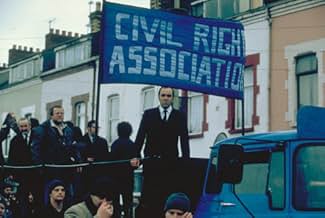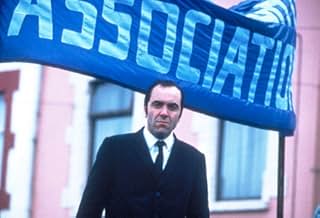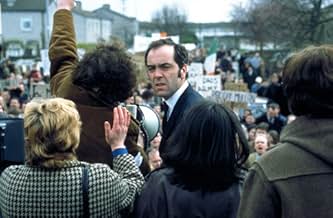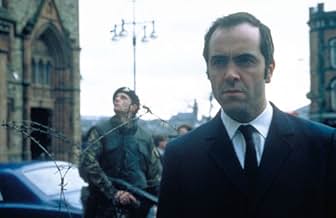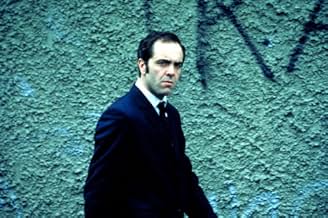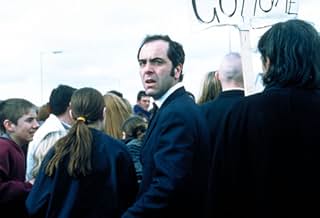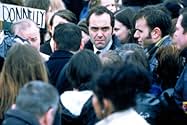Bloody Sunday
- 2002
- Tous publics
- 1h 51m
IMDb RATING
7.6/10
26K
YOUR RATING
A dramatization of the Irish civil rights protest march and subsequent massacre by British troops on January 30, 1972.A dramatization of the Irish civil rights protest march and subsequent massacre by British troops on January 30, 1972.A dramatization of the Irish civil rights protest march and subsequent massacre by British troops on January 30, 1972.
- Won 1 BAFTA Award
- 19 wins & 23 nominations total
Carmel McCallion
- Bridget Bond
- (as Carmel Mccallion)
Christopher Villiers
- Maj. Steele
- (as Chris Villiers)
- Director
- Writer
- All cast & crew
- Production, box office & more at IMDbPro
Featured reviews
"Bloody Sunday" is a very startling, cinema-verite recreation of a very specific date (January 30, 1972), in a very specific place (Derry, Northern Ireland) of an event that for the Irish became "our Sharpeville."
But for an American audience with no benefit of subtitles for the brogues and working class Brit accents, no explanations outside of eventual context for lingo and slang (it took me awhile to keep track of "provos" vs "paras"), the quasi-documentary, in-your-face approach takes on a tragic universality.
It could be part of a Cassandra trilogy with `Black Hawk Down' and `No Man's Land' about why military should not be in charge in urban strife, whether as "peacekeepers" or in civil wars or regime changes, no matter how heinous the regime to be changed. A lesson for the Baghdad invasion planners?
Cities are complicated social ecologies, and the film shows a great diversity of attitudes and pressures on all sides, managing to be both clinical in meticulous detail and visceral in shocking impact. The film is probably not objective about the British (I don't think it's a coincidence that the imperious Brit "observer" who takes repugnant charge is played by Tim Pigott-Smith who was a similar colonialist in `The Jewel in the Crown.") A central universal image becomes the awesome power of rock-throwing, unemployed teen-age boys to spark war.
The liberals in the middle, clinging to dreams of Gandhi, Martin Luther King, and fair community relations, are morally destroyed over the course of a few hours and the extremists with guns on both sides feed on each other in perpetual destruction like the ouroboros image of the snake eating itself. I kept feeling I missed the exact flash point in a wandering attention moment and wanted to immediately re-watch it to see if I could track the gotcha! moment when escalation could have been prevented, so I look forward to this being available on video tape.
But the film does clearly show that it was attitudes that created the violent outcome and consequent government non-investigation, as we see in so many police situations. Once soldiers enter a city it is a police situation with all those complexities.
I know James Nesbitt primarily from frothy Irish comedies, like `BallykissAngel,' so his staggering portrayal of the M.P. in the middle is a revelation, as he goes from planning a civil rights march to pleading with his girlfriend to physical heroism to a break-down in shock.
The version of the titular U2 song played out at the end, running well past the credits finish, is a moving, live, passionate audience sing-along where Bono shouts out other locales that have experienced similar situations to emphasize the universality.
But for an American audience with no benefit of subtitles for the brogues and working class Brit accents, no explanations outside of eventual context for lingo and slang (it took me awhile to keep track of "provos" vs "paras"), the quasi-documentary, in-your-face approach takes on a tragic universality.
It could be part of a Cassandra trilogy with `Black Hawk Down' and `No Man's Land' about why military should not be in charge in urban strife, whether as "peacekeepers" or in civil wars or regime changes, no matter how heinous the regime to be changed. A lesson for the Baghdad invasion planners?
Cities are complicated social ecologies, and the film shows a great diversity of attitudes and pressures on all sides, managing to be both clinical in meticulous detail and visceral in shocking impact. The film is probably not objective about the British (I don't think it's a coincidence that the imperious Brit "observer" who takes repugnant charge is played by Tim Pigott-Smith who was a similar colonialist in `The Jewel in the Crown.") A central universal image becomes the awesome power of rock-throwing, unemployed teen-age boys to spark war.
The liberals in the middle, clinging to dreams of Gandhi, Martin Luther King, and fair community relations, are morally destroyed over the course of a few hours and the extremists with guns on both sides feed on each other in perpetual destruction like the ouroboros image of the snake eating itself. I kept feeling I missed the exact flash point in a wandering attention moment and wanted to immediately re-watch it to see if I could track the gotcha! moment when escalation could have been prevented, so I look forward to this being available on video tape.
But the film does clearly show that it was attitudes that created the violent outcome and consequent government non-investigation, as we see in so many police situations. Once soldiers enter a city it is a police situation with all those complexities.
I know James Nesbitt primarily from frothy Irish comedies, like `BallykissAngel,' so his staggering portrayal of the M.P. in the middle is a revelation, as he goes from planning a civil rights march to pleading with his girlfriend to physical heroism to a break-down in shock.
The version of the titular U2 song played out at the end, running well past the credits finish, is a moving, live, passionate audience sing-along where Bono shouts out other locales that have experienced similar situations to emphasize the universality.
Normally I don't enjoy the handheld documentary style films, as they tend to induce waves of nausea, but Bloody Sunday had me riveted from the word go. That we already know how it's going to end is irrelevant, the pressure building on the day of the march is almost unbearable. Though there's been criticism that the film is slanted towards the republican point of view, I found it balanced, even in the depiction of the soldiers and officers. Everybody certainly looked the part and I went away feeling some sympathy for both sides. Given the close quarters and inflammatory nature of the conflict, it's amazing that bloodbaths like this (soldiers blasting civilians) haven't happened more often in Northern Ireland. It's only now, that retired soldiers have broken ranks and talked about what actually happened, that a film like this can see the light of day.
This is a film with a terrible nerve, from the press conferences in the Sunday morning, through the preparations for the march and the preparations of the military, and forward to the scenes in the hospital afterwards. The camera is working in a way, there you definitely can feel the gloomy weather and the excitement.
It's also a 1972 feeling about it, which doesn't feel acted, but like a documentary. James Nesbitt is making a tremendous job as the MP and when you notice that this man hasn't got an Oscar, the Oscar institution definitely seems like the stupid joke it is.
The only thing you can have against this Paul Greengrass' movie is the tendency in the end, where the relative documentary objectivity in the beginning, moves over to tendency. The unionists and the British government remain the totally bad guys and the catholics are the eternal martyrs. They might have been that this Sunday, but the conflict of Northern Ireland is a little more complicated.
However, this is definitely more exciting than most of what you see in the action genre.
It's also a 1972 feeling about it, which doesn't feel acted, but like a documentary. James Nesbitt is making a tremendous job as the MP and when you notice that this man hasn't got an Oscar, the Oscar institution definitely seems like the stupid joke it is.
The only thing you can have against this Paul Greengrass' movie is the tendency in the end, where the relative documentary objectivity in the beginning, moves over to tendency. The unionists and the British government remain the totally bad guys and the catholics are the eternal martyrs. They might have been that this Sunday, but the conflict of Northern Ireland is a little more complicated.
However, this is definitely more exciting than most of what you see in the action genre.
10mariobc
I saw this film about 2 years ago, and was extremely impressed with the realism of the film.Having served with the British Army in Northern Ireland many years later I found the atmosphere and the general appearance and manner of the Paras extremely accurate, as I have seen many films about Ireland when trying to portray British soldiers they unfortunately could of done a little better. I consider myself to be open minded and understood and sympathized with the local catholic population during these events as this is or was pretty much how things are with regards to the catholic population in Northern Ireland.For me, the main good points were that the film was made in a documentary style in which the facts were shown in a straight to the point manner without any fancy computer effects or handsome faces portraying the main players. well done to the production team !!!!
being from belfast, i have an all too familiar recollection of this and many other tragic events.
being born protestant, i have little use for the cowardly, yet brutal and malicious, mutation of the provisional ira; under the helm of gerry addams.
being born sentient, i have little use for the fire and brimstone polarisations; counterspin and half-truths of ian paisley.
being born human, i have empathy for the slain.
the bloody Sunday massacre in derry, was a tragic testament to man's blood-lust, fueled by fear and adrenaline. the events depicted in the movie "bloody Sunday," provide an arresting portrayal of a tacitly monumental aspect of modern ulster history. the portrayals of the people and the events maintain an objective testimony toward a tragedy that is both sobering and inexcusable.
"bloody Sunday" takes no sides, and distributes no blame. it simply reenacts the events as they were recorded, and lets the viewer make his or her own decisions.
if you are familiar with the conflict; if you are distressed by man's inhumanity unto himself; if you are simply interested in a detached account of history; this is an important film to see.
being born protestant, i have little use for the cowardly, yet brutal and malicious, mutation of the provisional ira; under the helm of gerry addams.
being born sentient, i have little use for the fire and brimstone polarisations; counterspin and half-truths of ian paisley.
being born human, i have empathy for the slain.
the bloody Sunday massacre in derry, was a tragic testament to man's blood-lust, fueled by fear and adrenaline. the events depicted in the movie "bloody Sunday," provide an arresting portrayal of a tacitly monumental aspect of modern ulster history. the portrayals of the people and the events maintain an objective testimony toward a tragedy that is both sobering and inexcusable.
"bloody Sunday" takes no sides, and distributes no blame. it simply reenacts the events as they were recorded, and lets the viewer make his or her own decisions.
if you are familiar with the conflict; if you are distressed by man's inhumanity unto himself; if you are simply interested in a detached account of history; this is an important film to see.
Did you know
- TriviaTo make this movie as authentic as possible, no lights were used in the movie and the camera work was entirely hand-held
- GoofsThe marchers carry homemade cardboard signs with slogans written on them. When shown from behind, some have modern printing ("Made in China") on them that are not appropriate for 1972.
- Quotes
Ivan Cooper: I just want to say this to the British Government... You know what you've just done, don't you? You've destroyed the civil rights movement, and you've given the IRA the biggest victory it will ever have. All over this city tonight, young men... boys will be joining the IRA, and you will reap a whirlwind.
- Crazy creditsThe live rendition of U2's Sunday, Bloody Sunday continues to play for a full three minutes over a black screen after the credits finish rolling.
- ConnectionsFeatured in The 2003 IFP Independent Spirit Awards (2003)
Details
Box office
- Budget
- £2,000,000 (estimated)
- Gross US & Canada
- $773,228
- Opening weekend US & Canada
- $29,419
- Oct 6, 2002
- Gross worldwide
- $1,758,689
- Runtime1 hour 51 minutes
- Color
- Sound mix
- Aspect ratio
- 1.85 : 1
Contribute to this page
Suggest an edit or add missing content


